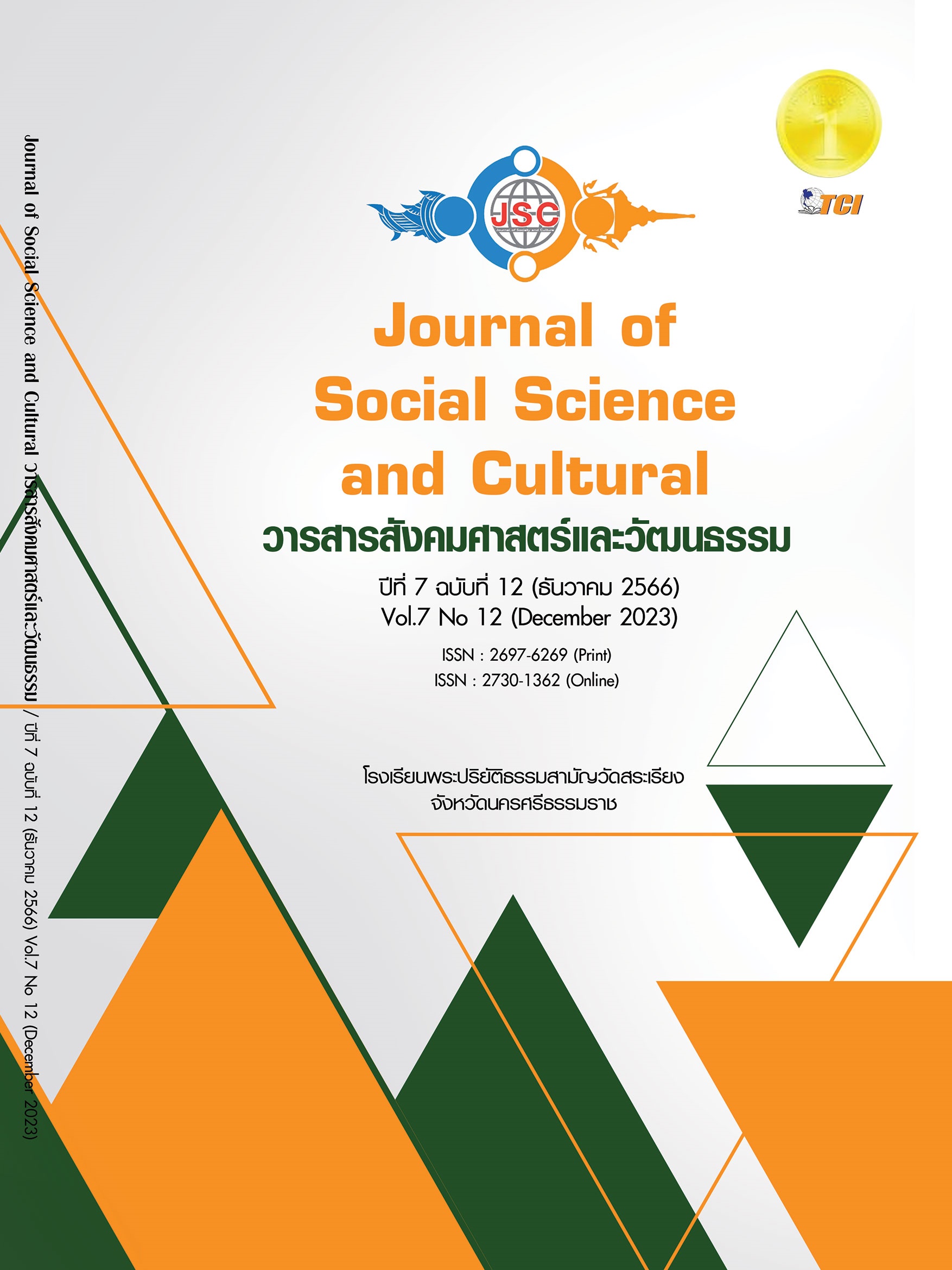THE DYNAMICS BELIEFS AND RITUALS OF THE SART DUEAN SIP CEREMONY AT PHRA MAHATHAT WORAMAHAWIHAN MONASTERY, NAKHON SI THAMMARAT PROVINCE
Main Article Content
Abstract
This research article aimed to study the dynamics of beliefs and rituals in the Sat Duean Sip or the tenth month ceremony at Phra Mahathat Woramahawihan Buddhist Monastery (or Wat Phra That), Nakhon Si Thammarat Province. The researcher focused on four issues, including the arranged offerings (mrap), traditional desserts, beliefs of hungry ghosts (preta), and robe-offering rituals for ancestors. The researcher divided the study into three periods, including the period of family reunion for the tenth month merit-making, the period of family reunion for visiting Wat Phra That’s festival, and the period of the creative reinvention of culture and ceremony to promote tourism. This research article used qualitative methodology. The results are as follows: For Period 1) people gathered, arranged offerings, and cooked at the elderly relatives’ houses. People helped each other in erecting platforms to offer food for preta and some participated in a playful tradition of grabbing food from preta. The descendants gather at a Buddhist temple and offered monastic robes to a monk as a way to make merits for the ancestors. They brought their ancestors’ ashes, pictures, and full names. For Period 2) the descendants usually did not participate in arranging mrap. Some had to buy agricultural produce, traditional desserts from the markets. For Period 3) the government and private organizations tried to promote this tradition for tourism by holding official competitions of offerings for the royal prizes. For the tenth-month desserts, the descendants did not make them anymore and these traditional desserts became mere food for rituals. The descendants paid much less attention to this concept of preta but it became a cultural commodity for the tourist industry. For the merit-making ritual for ancestors, the descendants paid much less attention to robe-offering rituals for ancestors. The suggestions from research include government and private agencies should preserve the beliefs and values of the rabbis that are paraded and contested in the Sart Duean Sip ceremony.
Article Details
References
กาญจนา เรืองช่วย. (28 ตุลาคม 2565). ความเชื่อเกี่ยวกับขนมเดือนสิบ. (พระครูวรวิริยคุณ (ปราโมทย์ กลิ่นละมัย), ผู้สัมภาษณ์)
ธัณธร ณ นคร. (20 ตุลาคม 2565). การจัดหมฺรับทำบุญเดือนสิบของตระกุล ณ นคร. (พระครูวรวิริยคุณ (ปราโมทย์ กลิ่นละมัย), ผู้สัมภาษณ์)
ธิดา สารยา. (2544). ประวัติศาสตร์สุโขทัย: พลังคน อำนาจผี บารมีพระ. กรุงเทพมหานคร: เมืองโบราณ.
นงเยาว์ โปนกแก้ว. (22 ตุลาคม 2565). การจัดหมฺรับทำบุญเดือนสิบ. (พระครูวรวิริยคุณ (ปราโมทย์ กลิ่นละมัย), ผู้สัมภาษณ์)
ประหยัด เกษม. (8 ตุลาคม 2565). การฟี้นฟูหมฺรับโบราณและการแห่หมฺรับเดือนสิบ. (พระครูวรวิริยคุณ (ปราโมทย์ กลิ่นละมัย), ผู้สัมภาษณ์)
ปรีชา นุ่นสุข. (2523). เดือนสิบ’ 23. กรุงเทพมหานคร: กรุงสยามการพิมพ์.
ปรีชา นุ่นสุข. (2544). ประวัติศาสตร์พุทธศาสนาในคาบสมุทรภาคใต้ของประเทศไทย. กรุงเทพมหานคร: การศาสนาและการวัฒนธรรมของกระทรวงศึกษาธิการ.
พระครูพรหมเขตคณารักษ์. (15 ตุลาคม 2565). ขนมเดือนสิบความเชื่อทางสังคมและวัฒนธรรม. (พระครูวรวิริยคุณ (ปราโมทย์ กลิ่นละมัย), ผู้สัมภาษณ์)
พระครูภาวนาจันทคุณ. (20 ตุลาคม 2565). การบังสุกุลและทำบุญเดือนสิบให้ตายาย. (พระครูวรวิริยคุณ (ปราโมทย์ กลิ่นละมัย), ผู้สัมภาษณ์)
วรสันต์ เพชรบุรี. (10 พฤษภาคม 2565). ความเชื่อเรื่องเปรตเดือนสิบ. (พระครูวรวิริยคุณ (ปราโมทย์ กลิ่นละมัย), ผู้สัมภาษณ์)
วิเชียร ณ นคร. (2526). นครศรีธรรมราช. กรุงเทพมหานคร: กรุงสยามการพิมพ์.
ศรีศักร วัลลิโภดม. (2554). สังคมไทยกับความเป็นมนุษย์ที่เปลี่ยนไป. วารสาร เมืองโบราณ, 28(1), 55-58.
สารภี ขาวดี. (2559). ประเพณีแซนโฎนตาบูชาบรรพบุรุษ จังหวัดสุรินทร์: การประกอบสร้างและบทบาทของประเพณีประดิษฐ์. ใน วิทยานิพนธ์ปรัชญาดุษฎีบัณฑิต สาขาวิชาภาษาไทย. จุฬาลงกรณ์มหาวิทยาลัย.
สุริชัย หวันแก้ว. (2549). อยู่ชายขอบ มองลอดความรู้: รวมบทความเนื่องในวาระครบรอบ 60 ปี ฉลาดชายรมิตานนท์. เชียงใหม่: มติชน.


